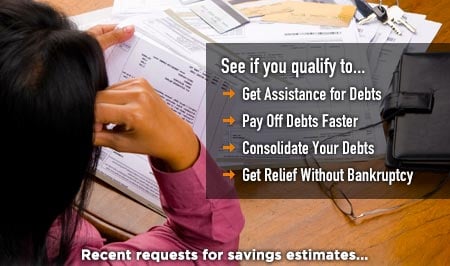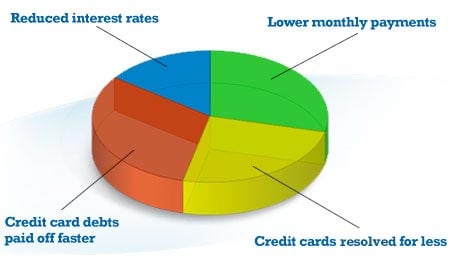
Debt Grant
If you're a resident of Arizona who is overwhelmed with credit card debts and are looking for relief, you may be thinking of applying for federal or state-sponsored programs or grants that can help you pay off your debts. Unfortunately, unlike the bailouts that the government gave banks and other financial institutions, the government does not provide debt relief grants or aid that are designed for consumers.
But the good news is, if you are struggling with high-interest credit card debts as well as other types of unsecured debts (such as medical bills, utilities, or department store charges), you certainly have debt relief options -- including debt consolidation, debt settlement, debt consolidation loans, or even bankruptcy. Both debt consolidation and debt settlement have become, for many consumers, popular alternatives to bankruptcy--which has a more damaging and longer lasting impact on your personal credit.
With the right debt relief option, you may find yourself able to breathe easier knowing that you can get expert help and get on a path to financial freedom. To learn more about your debt relief options, list your debt now and answer a few, simple questions to get your free debt relief analysis and savings estimate -- at no charge to you.
"How Can Debt Consolidation Help Me?"
Debt consolidation, or a debt management plan (DMP), gives individuals and families who are struggling with multiple debts the chance to combine, or consolidate, high-interest credit card and unsecured debts into one, more structured, and more manageable payment plan made to a credit counseling agency. Credit counseling agencies, in turn, distribute those funds to credit card companies in the debt management plan.
When you enroll in a debt consolidation program, credit counselors generally review your finances, debt amount, and sources of income and try to determine how much you can reasonably allocate each month to your debt payments. They typically create a strategy to help reduce your debts and submit proposals--on your behalf--to creditors asking for a reduction in interest rates, or the elimination of any late fees and other penalties. Creditors that agree to grant or extend favorable payment terms are placed into the debt management plan.
The goal of debt consolidation is to help you direct more of your funds towards paying the principal of your debts versus simply just paying the interest. If you want to learn how debt consolidation through credit counseling could potentially help you reduce your debts, answer a few, simple questions to request a free debt relief analysis and savings estimate.
"Do I Qualify for Debt Settlement?"
If you need relief from high-interest credit card debts but feel that you are running out of viable options, you may be interested in finding relief through debt settlement. Today, many families and individuals in Arizona have found relief by enrolling in debt settlement programs or plans that allow them to settle, or negotiate, with their creditors for significantly less than what they originally owe.
Keep in mind, however, the potential risks: When you enroll in a debt settlement program, your credit score will typically decline because it usually involves "falling behind" or foregoing your payments in order to set aside funds that can be used to make a settlement offer (or what's also called a lump sum payment). In addition, as you fall behind in making payments, you can also face legal action for, essentially, defaulting on the terms of your credit card agreements.
But in spite of all these risks, as a form of relief, debt settlement has become a popular alternative for many consumers who want to avoid declaring personal bankruptcy--which often has a more damaging and longer lasting impact to one's credit rating.
Statewide Assistance
As noted earlier, Arizona, like many states, does not have any credit card relief programs or grants to help consumers pay off their credit card and unsecured debts. However, it does offer a variety of services that provide low-income families with basic necessities.
Many low-income individuals and families qualify for cash assistance if they meet the state's eligibility requirements regarding income, number and age of dependents, and various other factors. For residents who need help putting food on the table, the Emergency Food Assistance Program provides nutritious meals, at no cost. Programs are also in place for needy families in the areas of health care, child care, and employment.
In addition, the U.S. Department of Housing and Urban Development has resources for the needy and guidance on how to keep their home and on preventing foreclosure.
For more information on state-wide economic aid resources click on this link.
"How Much Can I Save with Debt Relief?"
One of the most commonly asked questions from consumers who are comparing their debt relief options is how much they can save, every month, if they qualify. Depending on your financial situation, the amount of money that you can potentially save will vary depending on how much you originally owe, the current interest rates that you are paying, and any late fees or penalties.
The bottom line is, if you want to start being proactive about your debts, there is help. With the right debt relief program, for instance debt consolidation or debt settlement, you could be on your way to paying back your debts at a more manageable and predictable pace, and finally get back on the road to financial freedom. Start now by requesting your free debt relief analysis and savings estimate--it only takes minutes!





















